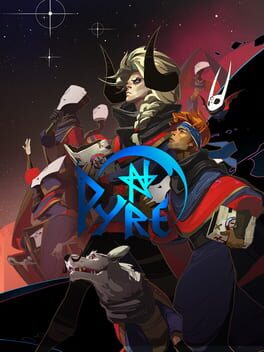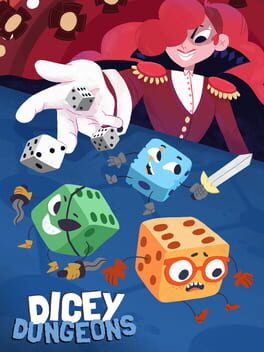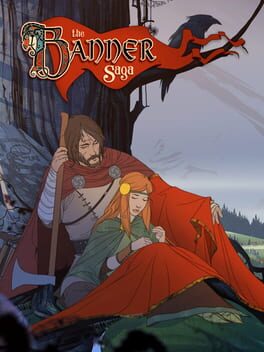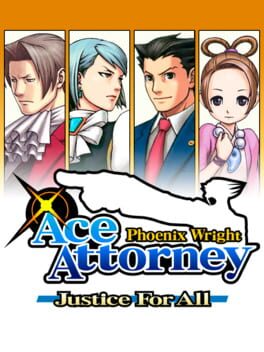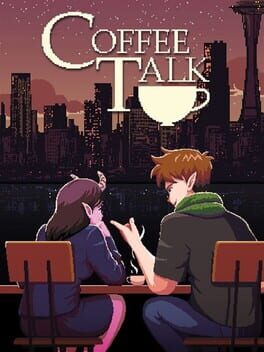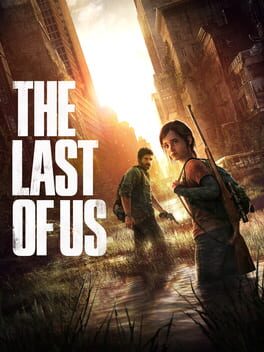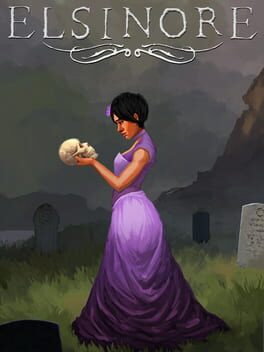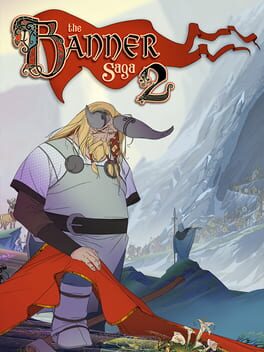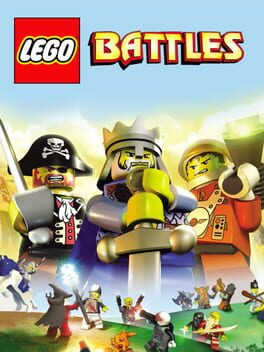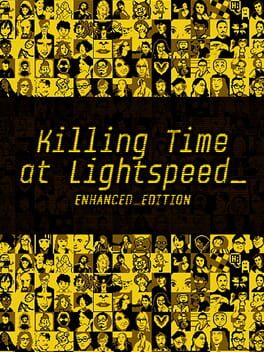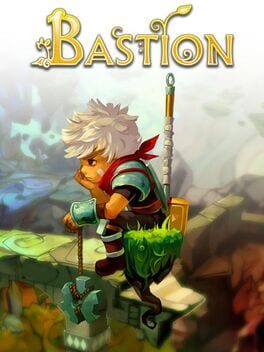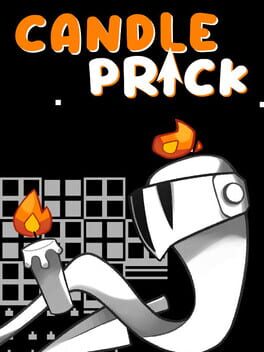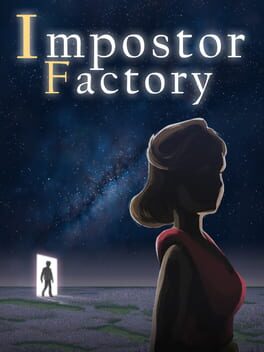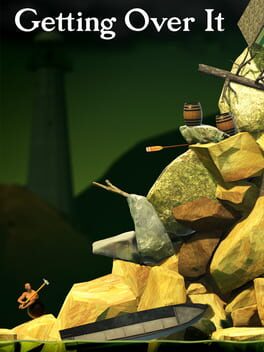MisterProject
2023
This game rocks. It really does. It's joy distilled in a bottle. It's fun incarnate. It's the platonic ideal of the phrase "videogames are cool".
Seldom have I seen a game so consistently able to put the player into Flow State. With its killer soundtrack, focused on catchy and recognizable beats, it becomes natural to simply follow the beat and enter into the game's rhythm.
You know... You know those action scenes at the end of movies where the band of heroes finally get their shit together and become supernaturally well-coordinated to beat the villains? They're always super cathartic, emotional and just a blast to watch. And I always get that nagging thought - "oh, wouldn't that be cool to do in a videogame?"
Well, there you have it. That's the feeling I get when I play this game. Its gratifying combat system, endearing characters, hearty artstyle and carefree attitude all contribute to a sense of mastery and freedom that's incredibly rewarding.
At the end of the game, I was almost tearing up, despite the generic plot beats and cliché message. Everything's just so damn well executed! The game has a vision, a personality and a concept, and it just commits to them 200%. I can confidently say that I love this game.
Seldom have I seen a game so consistently able to put the player into Flow State. With its killer soundtrack, focused on catchy and recognizable beats, it becomes natural to simply follow the beat and enter into the game's rhythm.
You know... You know those action scenes at the end of movies where the band of heroes finally get their shit together and become supernaturally well-coordinated to beat the villains? They're always super cathartic, emotional and just a blast to watch. And I always get that nagging thought - "oh, wouldn't that be cool to do in a videogame?"
Well, there you have it. That's the feeling I get when I play this game. Its gratifying combat system, endearing characters, hearty artstyle and carefree attitude all contribute to a sense of mastery and freedom that's incredibly rewarding.
At the end of the game, I was almost tearing up, despite the generic plot beats and cliché message. Everything's just so damn well executed! The game has a vision, a personality and a concept, and it just commits to them 200%. I can confidently say that I love this game.
2017
2019
A creative and colorful roguelike dice-building game with six different characters, each with their unique playstyle. Although luck is thematically placed front and center in this game, most matches don't feel cheaped out by RNG, as tactics such as risk management and number manipulation help alleviate a lot of would-be luck-related grievances.
Not only that, but the design of both the enemies and the cards allow for really inventive play with the dice received each round, estimulating a "work-with-what-you've-been-dealt" mentality that takes a lot of frustration out of the game and makes each round more or less independent from the rest, increasing the information fog and reducing analysis paralysis, which is something I really appreciate.
Not only that, but the design of both the enemies and the cards allow for really inventive play with the dice received each round, estimulating a "work-with-what-you've-been-dealt" mentality that takes a lot of frustration out of the game and makes each round more or less independent from the rest, increasing the information fog and reducing analysis paralysis, which is something I really appreciate.
2014
It's a beautiful and flawed mess. I honestly love the way this game presents its choices with a more pragmatic tone, something I feel is sorely lacking in videogames mostly plagued by idealism. Still, its gameplay loop is rather tedious at times (mostly due to its sluggish combat system and lack of variety in the design of both its classes and enemies) and the lack of QoL features such as an attack range previewer make it a very frustrating game to play.
This review contains spoilers
This game has some of the lowest lows and the highest highs of the franchise. On one hand, there are the first and third cases, one which is forgettable, the other which is nonsensical, boring and at times, borderline creepy (uh, two grown adults fighting for a 16 year old girl?).
On the other hand, there's Case 4. My favorite case of the entire series.
There are few instances in which I cry while playing video games. For all the 6 main games and the 2 spin-offs, I only cried once with the Ace Attorney series - and it was with this game.
While Justice for All doesn't offer much in terms of a grand narrative, only really contributing with the introduction of (the utterly adorable) Pearl and her mother, Justice for All works with themes - that is, the theme of Justice.
"What is justice?", the game asks. Is it justice to lust after revenge? Is it justice to imprison someone who's sorry for what they've done? Is it justice to defend someone to the bitter end?
This game, in my opinion, is the one in which Phoenix has the most growth and character development. When Miles returns and tells Phoenix that he'll need to learn what it really means to be a lawyer, he's right. If in the first game it was Edgeworth who had to go through a personal journey, this time, it's Wright the one who's walking down this path.
So, even though the rest of the game is mediocre, I don't care. As I said, Case 4 is still my all-time favorite case. When Phoenix, Maya and Pearl finally reunite... fuck, that's powerful. And that's what I think of Justice for All.
On the other hand, there's Case 4. My favorite case of the entire series.
There are few instances in which I cry while playing video games. For all the 6 main games and the 2 spin-offs, I only cried once with the Ace Attorney series - and it was with this game.
While Justice for All doesn't offer much in terms of a grand narrative, only really contributing with the introduction of (the utterly adorable) Pearl and her mother, Justice for All works with themes - that is, the theme of Justice.
"What is justice?", the game asks. Is it justice to lust after revenge? Is it justice to imprison someone who's sorry for what they've done? Is it justice to defend someone to the bitter end?
This game, in my opinion, is the one in which Phoenix has the most growth and character development. When Miles returns and tells Phoenix that he'll need to learn what it really means to be a lawyer, he's right. If in the first game it was Edgeworth who had to go through a personal journey, this time, it's Wright the one who's walking down this path.
So, even though the rest of the game is mediocre, I don't care. As I said, Case 4 is still my all-time favorite case. When Phoenix, Maya and Pearl finally reunite... fuck, that's powerful. And that's what I think of Justice for All.
2020
It achieves exactly what it sets out to do - provide a chill, laidback experience with empathetic characters and a relaxing vibe. For this type of game, it needed to nail the writing, the atmosphere and the aesthetics - fortunately, I'm happy to report that all three meet their goals.
Yeah, it's not a grand story, and it's not a deep narrative - but it's heart-warming and charming, like the digital equivalent of a friend's hug after a rough week. With everything that's happening in the world right now, I think all of us would benefit from having that sometimes, and Coffee Talk delivers it perfectly.
Yeah, it's not a grand story, and it's not a deep narrative - but it's heart-warming and charming, like the digital equivalent of a friend's hug after a rough week. With everything that's happening in the world right now, I think all of us would benefit from having that sometimes, and Coffee Talk delivers it perfectly.
2013
A powerful and effective story supported by gritty and tense gameplay. The interactions between Joel and Ellie are still some of the best writing and voice acting work I've seen, and even now I still remember most of its story beats. It's rare that I like (or even play) a triple-A game, but this is one of them.
2019
This might sound silly, but I'd actually describe this game as an "information roguelite". Elsinore is a narrative-focused timeloop game, and as such, every new timeline becomes almost like a 'run', exploring different characters' backstories and trying to achieve different endings by manipulating certain events.
And there's a lot of variation here, by the way. By using Shakespeare's Hamlet as a canvas, the game is able to craft a very intricate web of relationships, conversations and happenings that the player is able to pull in various directions. By orchestrating the death of certain characters, chaotic domino effects can occur, resulting in wildly different outcomes. As a story engine, it's a great game.
Well, what about the story itself? Is it good? Yes, yes it is. The developers do make certain alterations in regards to the original text, but I'd argue these are a net positive. Most of the cast is pretty well-developed and charismatic, and although you do become numb to their deaths after seeing them so many times (which I actually find great), I found that I still cared deeply for them. Hamlet, Ophelia, Horatio and Polonius were personally my favorites.
All in all, I enjoyed my time with this one. With me being in the control of the story, exploring different weaves and facets of each character in every 'run', I almost never became bored with the game or found its pacing slow. The storylines all intertwine and regularly reveal new information, peeling away at the layers of Elsinore.
And there's a lot of variation here, by the way. By using Shakespeare's Hamlet as a canvas, the game is able to craft a very intricate web of relationships, conversations and happenings that the player is able to pull in various directions. By orchestrating the death of certain characters, chaotic domino effects can occur, resulting in wildly different outcomes. As a story engine, it's a great game.
Well, what about the story itself? Is it good? Yes, yes it is. The developers do make certain alterations in regards to the original text, but I'd argue these are a net positive. Most of the cast is pretty well-developed and charismatic, and although you do become numb to their deaths after seeing them so many times (which I actually find great), I found that I still cared deeply for them. Hamlet, Ophelia, Horatio and Polonius were personally my favorites.
All in all, I enjoyed my time with this one. With me being in the control of the story, exploring different weaves and facets of each character in every 'run', I almost never became bored with the game or found its pacing slow. The storylines all intertwine and regularly reveal new information, peeling away at the layers of Elsinore.
2016
TBS 2 greatly improves on everything TBS 1 laid the ground of, be it gameplay, be it story. Both enemy and class increase immensely in variety, and the story beats the game goes through become even more epic and tense.
Unfortunately, all the other problems from TBS 1 persist - the combat does get sluggish at times, and the lack of an attack range previewer continues to frustrate me to no end. The ending of the game, by the way, was one of the most gimmicky, badly designed and terrible experiences I've had with a game in a while. So yeah, a lot of good and bad stuff in this.
Unfortunately, all the other problems from TBS 1 persist - the combat does get sluggish at times, and the lack of an attack range previewer continues to frustrate me to no end. The ending of the game, by the way, was one of the most gimmicky, badly designed and terrible experiences I've had with a game in a while. So yeah, a lot of good and bad stuff in this.
2009
I'll write this through the lenses of a child, as this was how I first played this game and how the designers probably intended it to be played.
I had never played an RTS before. For someone just starting out, slowly understanding how the economy of collecting resources and amassing an army functions was a delight. The different factions with their different maps and units were also a treat, especially considering that after beating a campaign with one of the factions, you got to play and understand the other side. This narrative trick was really novel to me.
The thing that I most fondly remember of this game, however, were the cutscenes with the now well-known flavor of LEGO-themed humor. They were the reward at the end of the journey, the cherry on top.
And yeah, I could mention the game was a bit buggy, but honestly, as a child, you don't really care about those things that much. I was so enthralled by the story and the gameplay that I just ate it all up. Nowadays, I see the many flaws of this game... but in the end, what matters is the experience - and mine was a great one.
I had never played an RTS before. For someone just starting out, slowly understanding how the economy of collecting resources and amassing an army functions was a delight. The different factions with their different maps and units were also a treat, especially considering that after beating a campaign with one of the factions, you got to play and understand the other side. This narrative trick was really novel to me.
The thing that I most fondly remember of this game, however, were the cutscenes with the now well-known flavor of LEGO-themed humor. They were the reward at the end of the journey, the cherry on top.
And yeah, I could mention the game was a bit buggy, but honestly, as a child, you don't really care about those things that much. I was so enthralled by the story and the gameplay that I just ate it all up. Nowadays, I see the many flaws of this game... but in the end, what matters is the experience - and mine was a great one.
This review contains spoilers
After thinking for a while, I've come to realize that I don't really like this game. The questions it poses and the world it presents are interesting enough, yes, but at the same time there were multiple points in which I didn't find it very believable. I also didn't care much for its characters, which were mostly fine but not that compelling, and its ending, which was just brutally abrupt and unsatisfying.
Perhaps I'm just not its target audience, as I loathe browsing Facebook and Twitter. Watching a group chat on Whatsapp or Discord probably would've made a bigger impact on me. Ah, oh well.
Perhaps I'm just not its target audience, as I loathe browsing Facebook and Twitter. Watching a group chat on Whatsapp or Discord probably would've made a bigger impact on me. Ah, oh well.
2011
2022
A well-polished, well-designed sokoban game with smart puzzles and smart solutions. With its simple set of core elements and mechanics, the game presents an emergent system of interactions and problems that requires creative and out-of-the-box thinking to solve.
I also appreciate the game's pacing with its overworld, divided into separate regions. Each region explores a different facet of the game's design and helps to gently guide the player into unusual mindsets. Very rarely will the player find themselves soft-locked due to being stuck on a puzzle - if you can't get through a certain level, you can always try another one in a different region.
The goal of most puzzle games, I find, is to make the player feel smart - and Candle Prick certainly delivers that. It's challenging without being intimidating; it provides hints without being hand-holding or condescending; and it's deep without being overly complex. I'm usually not a fan of puzzle games, but I wholeheartedly recommend this one.
I also appreciate the game's pacing with its overworld, divided into separate regions. Each region explores a different facet of the game's design and helps to gently guide the player into unusual mindsets. Very rarely will the player find themselves soft-locked due to being stuck on a puzzle - if you can't get through a certain level, you can always try another one in a different region.
The goal of most puzzle games, I find, is to make the player feel smart - and Candle Prick certainly delivers that. It's challenging without being intimidating; it provides hints without being hand-holding or condescending; and it's deep without being overly complex. I'm usually not a fan of puzzle games, but I wholeheartedly recommend this one.
2021
This review contains spoilers
This was the email I sent Freebird Games after this game came out:
"I often wondered about whether games could really, truly change someone's life - make someone reflect on their life decisions, or help them clarify some of their thoughts about themselves or the world around them. I've played many games, some with great emotional impact or that were really fun experiences that brought me joy. But this one, Impostor Factory, this was one of the only ones that really changed me. That changed my life.
When I played Finding Paradise, I cried at the end - Colin's obssession with the imaginary was something I found quite relatable. I thought that was the peak of what games could do for me, as at the time I was somewhat of a colder person. I enjoyed the game, called it a masterpiece, and moved on.
Then four years later, Impostor Factory came along. I was now a different person, at a different mood and with different emotions. I was grappling with my own insecurities and fears of what the future would look like for me. I was clinging to the idea that I would live my life focusing on one single objective, and kind of ignore everything else, including relationships, to pursue that goal.
So when that conversation between Quincy and Lynri about their different viewpoints on how life should be lived occurred... something clicked with me. I began thinking more and more about this concept - Lavenders and Stars - and really question whether I really wanted to beeline myself into one single goal.
My time here is limited, and I didn't want to leave without leaving a mark, as a 'mediocre' person. But at the same time, I realized... I don't want to be alone. I realized I was masking my fear of coming out to my parents with the idea that I didn't want relationships, and as such would never have to discuss such things with them. I felt trapped and alone, but I didn't want to admit it. I had built up this totem of "Relationships are dumb and I'm above them" for so long that I couldn't question it anymore. It became almost a dogma.
After all of that (and some conversations with some of my friends), I decided to come out to my mom. For eight years I knew I liked boys, but I never could muster the courage to tell it to her until now. At the end of the conversation, she hugged me and said that I should've said it much earlier, and that she would always support me. If I hadn't played this game and hadn't had those conversations, perhaps I would've just decided to go on with my life without telling her anything. Would I be a happy person? Perhaps, perhaps not. But without a doubt, this freed me from my cage.
So, yeah. Sorry for the wall of the text, and thanks again. I feel so much lighter than before, and your game really helped me with that. Your games are awesome."
"I often wondered about whether games could really, truly change someone's life - make someone reflect on their life decisions, or help them clarify some of their thoughts about themselves or the world around them. I've played many games, some with great emotional impact or that were really fun experiences that brought me joy. But this one, Impostor Factory, this was one of the only ones that really changed me. That changed my life.
When I played Finding Paradise, I cried at the end - Colin's obssession with the imaginary was something I found quite relatable. I thought that was the peak of what games could do for me, as at the time I was somewhat of a colder person. I enjoyed the game, called it a masterpiece, and moved on.
Then four years later, Impostor Factory came along. I was now a different person, at a different mood and with different emotions. I was grappling with my own insecurities and fears of what the future would look like for me. I was clinging to the idea that I would live my life focusing on one single objective, and kind of ignore everything else, including relationships, to pursue that goal.
So when that conversation between Quincy and Lynri about their different viewpoints on how life should be lived occurred... something clicked with me. I began thinking more and more about this concept - Lavenders and Stars - and really question whether I really wanted to beeline myself into one single goal.
My time here is limited, and I didn't want to leave without leaving a mark, as a 'mediocre' person. But at the same time, I realized... I don't want to be alone. I realized I was masking my fear of coming out to my parents with the idea that I didn't want relationships, and as such would never have to discuss such things with them. I felt trapped and alone, but I didn't want to admit it. I had built up this totem of "Relationships are dumb and I'm above them" for so long that I couldn't question it anymore. It became almost a dogma.
After all of that (and some conversations with some of my friends), I decided to come out to my mom. For eight years I knew I liked boys, but I never could muster the courage to tell it to her until now. At the end of the conversation, she hugged me and said that I should've said it much earlier, and that she would always support me. If I hadn't played this game and hadn't had those conversations, perhaps I would've just decided to go on with my life without telling her anything. Would I be a happy person? Perhaps, perhaps not. But without a doubt, this freed me from my cage.
So, yeah. Sorry for the wall of the text, and thanks again. I feel so much lighter than before, and your game really helped me with that. Your games are awesome."
I did, in fact, get over it. But what I found on the other side wasn't worth it. And don't start with the "but the journey is what matters" crap - really? Bennett Foddy's genius thesis statement is that "frustration is underrated"?
Mate, what the fuck. What's the definition of frustration? What's the point of frustration if not for something better down the line? Is this game supposed to be just training for getting over frustration, and that's it? All of its self-aggrandizing just to validate this fake sense of accomplishment?
I don't know. My reaction when I climbed it was neutered, weak. There was a glimmer of happiness, but when I looked down, I realized how pointless the entire journey was. I felt almost foolish, like Foddy roped me into this, promising it would be something worth remembering. That's the trap I fell into.
Daniel Kahneman describes two selves in "Thinking Fast and Slow" - the One Who Experiences, and the One Who Remembers. In the pursuit of a game worth remembering, this game ditches almost entirely the experience of play itself. I ask you, truly - would you still play this game if all proof that you climbed it vanished right after you conquered it? Would you?
See, Hollow Knight was a satisfying, but difficult, experience. Celeste was a satisfying, but difficult, experience. But this, this was not that. I wouldn't go so far as to say that the hammer mechanic itself sucks - it does have its intricacies and nuances that make for a good platforming game - but the game's disdain for permanent progress feels so unnecessarily mean and arbitrary. The game's failure to provide a satisfying experience isn't excused by it being intentional.
Mate, what the fuck. What's the definition of frustration? What's the point of frustration if not for something better down the line? Is this game supposed to be just training for getting over frustration, and that's it? All of its self-aggrandizing just to validate this fake sense of accomplishment?
I don't know. My reaction when I climbed it was neutered, weak. There was a glimmer of happiness, but when I looked down, I realized how pointless the entire journey was. I felt almost foolish, like Foddy roped me into this, promising it would be something worth remembering. That's the trap I fell into.
Daniel Kahneman describes two selves in "Thinking Fast and Slow" - the One Who Experiences, and the One Who Remembers. In the pursuit of a game worth remembering, this game ditches almost entirely the experience of play itself. I ask you, truly - would you still play this game if all proof that you climbed it vanished right after you conquered it? Would you?
See, Hollow Knight was a satisfying, but difficult, experience. Celeste was a satisfying, but difficult, experience. But this, this was not that. I wouldn't go so far as to say that the hammer mechanic itself sucks - it does have its intricacies and nuances that make for a good platforming game - but the game's disdain for permanent progress feels so unnecessarily mean and arbitrary. The game's failure to provide a satisfying experience isn't excused by it being intentional.

